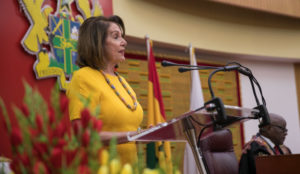
Speaker of U.S. House of Representatives Nancy Pelosi led a U.S. congressional delegation to Ghana from July 28 -31, 2019 to commemorate the “Year of Return” and mark 400 years since the first enslaved Africans arrived in Jamestown, Virginia. Official U.S. Embassy photograph by: Archibald Sackey and Courage Ahiati.
In the Wall Street Journal, Casey Mulligan, an economics professor at the University of Chicago, and Stephen Moore, a member of President Trump’s Economic Recovery Task Force, put forward a positive plan for reopening America.
Their plan would stimulate the economy, and avoid the terrible side effects of the plan offered by House Speaker Nancy Pelosi. They write:
The White House will soon begin negotiating with congressional Democrats on a “Phase 4” economic revival plan. President Trump has repeatedly expressed his support for suspending the payroll tax through the end of the year as a way to stimulate jobs and help low- and middle-income families gain after-tax income. Speaker Nancy Pelosi opposes the idea. Instead, she’s pushing the $3 trillion spending bill that passed the House in May, which includes a six-month extension of the $600-a-week supplemental unemployment payments enacted in March, which are scheduled to end July 31.
These proposals create opposite economic incentives. The payroll tax suspension would reward employees for returning to their jobs and working more hours by providing a 7.5% rise in take home-pay immediately on income up to $137,700. (Income over this amount would still be taxed at the usual rate, which is lower.) The suspension of the additional 7.5% tax on employers’ wage and salary costs would encourage small businesses to hire more employees by reducing the cost.
The unemployment-benefit extension would discourage work. According to the Congressional Budget Office, it would pay 5 out of 6 workers more to stay unemployed than to return to their previous jobs. Already employers are having trouble persuading employees to come back.
In a study released this week by the Committee to Unleash Prosperity, we estimate, based on employment sensitivity to higher wages, that the full suspension of the payroll tax through the rest of the year would increase employment by about 2.7 million jobs. This would stimulate the economy, increasing gross domestic product in the fourth quarter by 1.2% over what it otherwise would be.
Low-income Americans would disproportionately benefit from this policy because they pay a larger share of their income in payroll taxes. A University of Pennsylvania Wharton School study estimates a gain of after-tax income to the lowest-income workers at 7.2% to 10.7%, as employers pass on part of their tax savings in higher pay.
By contrast, we estimate the Pelosi plan would eliminate 10 million jobs and increase the unemployment rate by 6 to 8 points (after adjusting for misclassification errors). That would depress GDP for the rest of the year by roughly 5%. Our estimate is lower than those of some other researchers—for example, a Heritage Foundation study that put job losses at 13.9 million.
Pelosi, and the Democratic governors who have gone wild in blue states, are doing more to hold America back than they are to help. They’re protecting the rich when they should be getting on board with a plan that puts regular Americans back to work.
Originally posted on Your Survival Guy.
